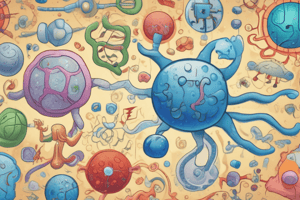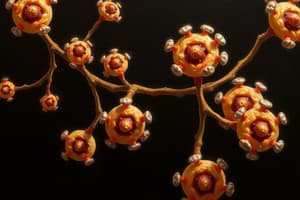Podcast
Questions and Answers
What type of interaction is responsible for the binding of peptides to MHC molecules?
What type of interaction is responsible for the binding of peptides to MHC molecules?
- Covalent interaction
- Ionic interaction
- Non-covalent interaction (correct)
- Hydrogen bonding
What contributes to peptide-MHC interaction via hydrogen bonding and charge interactions?
What contributes to peptide-MHC interaction via hydrogen bonding and charge interactions?
aa residues on the a-helices of the cleft
Class III MHC molecules are functionally related to MHC I & II molecules.
Class III MHC molecules are functionally related to MHC I & II molecules.
False (B)
Class I molecules are constitutively expressed on virtually all _ cells.
Class I molecules are constitutively expressed on virtually all _ cells.
Match the cytokines with their effect on MHC expression:
Match the cytokines with their effect on MHC expression:
What do antigen presenting cells (APCs) do with antigens entering the body?
What do antigen presenting cells (APCs) do with antigens entering the body?
Which of the following statements is true? Select all that apply.
Which of the following statements is true? Select all that apply.
What do genes responsible for graft acceptance or rejection be called?
What do genes responsible for graft acceptance or rejection be called?
MHC molecules are always co-dominantly expressed in each individual.
MHC molecules are always co-dominantly expressed in each individual.
MHC molecules are highly ________.
MHC molecules are highly ________.
Flashcards are hidden until you start studying
Study Notes
Antigen Presentation to T Lymphocytes
- Antigens entering the body are taken up by antigen presenting cells (APCs) through phagocytosis or infection.
- Some of the antigens are processed for presentation to T cells as peptides, while some are retained in their native configuration for display to B cells.
- T lymphocytes cannot interact with free antigens and can only recognize antigens displayed on APCs.
Major Histocompatibility Complex (MHC) Molecules
- MHC molecules are self-markers expressed on all host cells (except RBCs).
- MHC molecules enable T lymphocytes to recognize cell-associated antigens.
- T cell receptors (TCRs) can specifically interact with MHC-antigen complexes expressed on different cells.
- There are two types of MHC molecules: class I and class II.
Class I MHC Molecules
- Class I MHC molecules complex with intracellular/cytosolic antigens (e.g. viral peptides from virus-infected cells, antigens present in tumor cells, self and altered self peptides).
- Class I MHC molecules present peptides to CD8+ cytotoxic T cells.
Class II MHC Molecules
- Class II MHC molecules complex with extracellular/vesicular antigens (e.g. all self and non-self proteins taken up by cells via phagocytosis or endocytosis).
- Class II MHC molecules present peptides to CD4+ helper T cells.
Discovery of MHC
- The MHC was discovered as the genetic locus whose products are responsible for rapid rejection of tissue grafts exchanged between inbred strains of mice.
- MHC genes control immune responsiveness to protein antigens.
- MHC genes were initially thought to be involved only in graft rejection, but later found to be essential for immune responses to protein antigens.
Structure of MHC Molecules
- MHC molecules consist of an extracellular peptide-binding cleft (groove) followed by Ig-like domains, transmembrane, and cytoplasmic domains.
- The polymorphic amino acid residues of MHC molecules are located in and adjacent to the peptide-binding cleft.
- The nonpolymorphic Ig-like domains of MHC molecules contain binding sites for the T cell molecules CD4 and CD8.
CD4 and CD8
- CD4 and CD8 are considered co-receptors; they do not bind to the antigen.
- CD8 interacts selectively with MHC I molecules (cytotoxic T lymphocytes).
- CD4 interacts selectively with MHC II molecules (helper T lymphocytes).
Polymorphic Residues of MHC Molecules
- MHC genes are the most polymorphic genes present in the genome of all species analyzed.
- MHC genes are always co-dominantly expressed in each individual (i.e. both classes I and II should be expressed in an individual).
Class I MHC Molecules
- Class I MHC molecules consist of 2 non-covalently linked polypeptide chains: MHC-encoded α chain and non-MHC-encoded β chain.
- The α chain possesses three main moieties: extracellular region, transmembrane region, and cytoplasmic region.
Class II MHC Molecules
- Class II MHC molecules consist of 2 non-covalently linked polypeptide chains: α chain and β chain.
- The α and β chains of MHC II molecules possess three main moieties: extracellular region, transmembrane region, and cytoplasmic region.
Peptide Binding to MHC Molecules
- For a protein to be immunogenic in an individual, processing by an APC must produce peptides that can bind to the MHC molecules of that individual.
- Each MHC I and MHC II molecule has a single peptide-binding cleft (but it can bind many, different peptides).
- The binding of peptides to MHC molecules is a non-covalent interaction mediated by residues both in the peptides and in the peptide-binding clefts of MHC molecules.
Genomic Organization of MHC Molecules
- Many of the proteins involved in the processing of antigenic peptides and presentation of such peptides to T cells are encoded by genes located within the MHC genes.
- Within class II and I loci are genes that encode several proteins that play critical roles in antigen processing.
Expression of MHC Molecules
- Class I molecules are constitutively expressed on virtually all nucleated cells.
- Class II molecules are normally expressed on APCs (dendritic cells, B cells, macrophages) and a few other cell types following induction.
- The expression of MHC molecules is modulated by cytokines produced during both innate and adaptive immune responses.
Studying That Suits You
Use AI to generate personalized quizzes and flashcards to suit your learning preferences.




